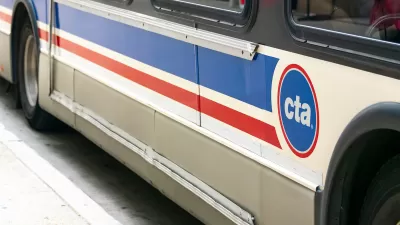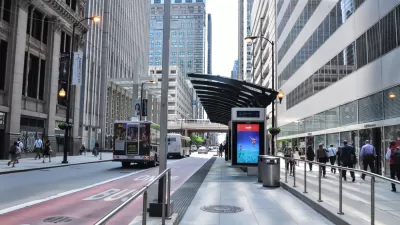The Central Loop BRT project, scheduled to break ground this month, will improve commuter travel times. But a collection of compromises means many ideal BRT components won't be installed.

Eric Jaffe writes that while Chicago's upcoming Central Loop BRT corridor will benefit travelers, the pro-bus community isn't wholly satisfied with compromises made. "Several design elements of top-notch BRT are missing from the Central Loop project. Only one of the eight stops will have off-board fare payment when the system launches. The Windy City has passed on weather-enclosed train-style stations for open bus shelters. The buses will lack camera-enforcement for exclusive lanes and even lose that exclusivity for a block."
Concern among bus supporters extends to the planned Ashland corridor, a more ambitious BRT project. "They share a general fear that skimping on core BRT elements could compromise the project and make it harder to gain public support later on for service expansions or improvements. Such concerns have left some BRT advocates wondering if Chicago is in danger of failing to become the American model of world-class bus service."
A long-term parking revenue deal also means Chicago cannot redesign its streets freely. "For a one-time fee of $1.15 billion—most of it spent immediately filling budget deficits—Chicago leased its parking spaces, and the meter revenue that comes with them, to Morgan Stanley for the next 75 years."
Jaffe concludes on a positive note: "A final point in the plus column: whatever compromises the Central Loop BRT has endured is in many ways a product of the very public feedback system cities have demanded."
FULL STORY: The Cracks in Chicago's Grand Plans for the Bus

Alabama: Trump Terminates Settlements for Black Communities Harmed By Raw Sewage
Trump deemed the landmark civil rights agreement “illegal DEI and environmental justice policy.”

Planetizen Federal Action Tracker
A weekly monitor of how Trump’s orders and actions are impacting planners and planning in America.

Why Should We Subsidize Public Transportation?
Many public transit agencies face financial stress due to rising costs, declining fare revenue, and declining subsidies. Transit advocates must provide a strong business case for increasing public transit funding.

Understanding Road Diets
An explainer from Momentum highlights the advantages of reducing vehicle lanes in favor of more bike, transit, and pedestrian infrastructure.

New California Law Regulates Warehouse Pollution
A new law tightens building and emissions regulations for large distribution warehouses to mitigate air pollution and traffic in surrounding communities.

Phoenix Announces Opening Date for Light Rail Extension
The South Central extension will connect South Phoenix to downtown and other major hubs starting on June 7.
Urban Design for Planners 1: Software Tools
This six-course series explores essential urban design concepts using open source software and equips planners with the tools they need to participate fully in the urban design process.
Planning for Universal Design
Learn the tools for implementing Universal Design in planning regulations.
Caltrans
Smith Gee Studio
Institute for Housing and Urban Development Studies (IHS)
City of Grandview
Harvard GSD Executive Education
Toledo-Lucas County Plan Commissions
Salt Lake City
NYU Wagner Graduate School of Public Service




























